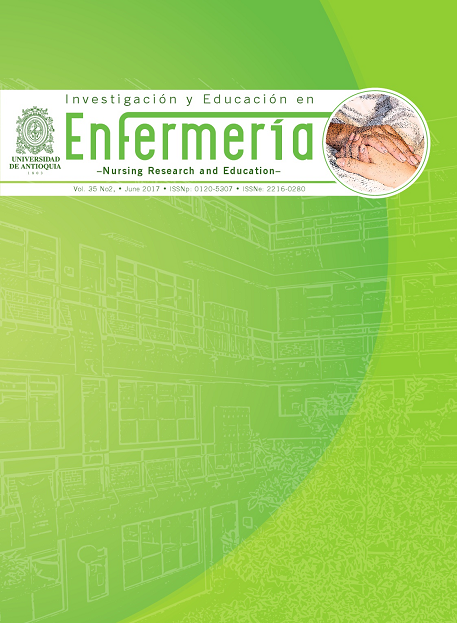The Meaning of Assuming Dependency at Home of a Person with Cardiovascular Surgery: the Vision of Informal Caregivers
DOI:
https://doi.org/10.17533/udea.iee.v35n2a12Keywords:
Caregivers, cardiac surgical procedures, self care, qualitative research.Abstract
Objective. Herein, the study sought to understand the significance for informal caregivers of assuming the dependency at home of an individual subjected to cardiovascular surgery.
Methods. This was a phenomenological interpretative study conducted with eight adult participants, home caregivers of individuals with cardiovascular surgery discharged from intensive care units to their homes. An indepth interview was used as technique to collect the information and the procedures proposed by Cohen, Kahn, and Steeves were used for analysis.
Results.
Caregivers of individuals with cardiovascular surgery at home face situations that lead them to taking on the dependency of the person being cared. The significance participants granted to the experience was the lack of preparation to deal with it due to the unexpected way it emerged. This created a difficult situation, where feelings surfaced, like misgivings, fear, and stress during the time dedicated to caring. In some cases, the caregiver prolonged the dependency of caring for another.
Conclusion. Undertaking the dependency of a person at home meant to caregivers coping with new situations without preparation. This dependency stirs feelings and sometimes limits participation by the
person in their own care. Descriptors: caregivers; cardiac surgical procedures; self care; qualitative research.
How to cite this article: Tamayo FD. The Meaning of Assuming Dependency at Home of a Person with Cardiovascular Surgery: the Vision of Informal Caregivers. Invest. Educ. Enferm. 2017; 35(2):232-243.
Downloads
References
(1) García M, Rodríguez M, Eguiguren A. El sistema informal de cuidados en clave de desigualdad. Gac Sanit. 2012; 18(4):132-39.
(2) De la Cuesta C. Cuidado familiar en condiciones crónicas: una aproximación a la literatura. Texto Contexto Enferm. 2004; 13(1):137-46.
(3) Badia X, Lara N, Roset M. Calidad de vida, tiempo de dedicación y carga percibida por el cuidador informal del enfermo con Alzheimer. Rev. Aten. Prim. 2013; 34(4): 170-77.
(4) Montalvo A, Cabrera B, Quiñones S. Enfermedad crónica y sufrimiento: revisión de literatura. Aquichan. 2012; 12(2):134-43.
(5) Guedes AC, Pereira M. Burden, Coping, Physical Symptoms and Psychological Morbidity in Caregivers of Functionally Dependent Family Members. Rev. Latino-Am. 2013;21(4):935-40.
(6) Uribe MT, Muñoz C, Restrepo J. Percepción familiar del paciente crítico cardiovascular. Invest. Educ. Enferm. 2004; 22(1):50-61.
(7) De la Cuesta C. El cuidado familiar: una revisión crítica. Invest. Educ. Enferm. 2009; 27(1):96-102.
(8) Cohen M, Kahn D, Steeves R. Hermeneutic phenomenological research. A practical guide for nurse researchers. Filadelpia: Ed Sage; 2012. P.76-7
(9) Zambrano EM, Guerra MD. Formación del cuidador informal: Relación con el tiempo de cuidado a personas dependientes mayores de 65 años. Aquichan. 2012; 12(3):241–51.
(10) Barrera L. El cuidado del cuidador que enfrenta enfermedades crónicas. En: cuidado y práctica de enfermería. Universidad Nacional de Colombia, Facultad de Enfermería. Bogota: Unibiblos; 2013. P.233-37
(11) Nkongho N. The caring ability inventory. En: Strickland OL, Waltz CF. Measurement of nursing outcomes: Selft care and coping. New York: Springer; 1990. P.3-16
(12) Chaparro L. Cómo se constituye el “vínculo especial” de cuidado entre la persona con enfermedad crónica y el cuidador familiar. Aquichan. 2012;11(1):7-22.
(13) Lima L, Borges D, Costa S, Rabelo E. Clasificación de pacientes según el grado de dependencia de los cuidados de enfermería y de la gravedad en una unidad de recuperación postanestésica. Rev. Latino-Am. Enfermagem. 2011; 18(5):1-7.
(14) Gala B, Romeo L, Pérez R. La enfermera, profesional clave para la coordinación de la atención socio sanitaria a personas con demencia. Index Enferm. 2006; 15(54):7-9.
(15) Irigibel X. Revisión crítica de una interpretación del pensamiento de Virginia Henderson: Acercamiento epistemológico al libro de Luis Fernández y Navarro. Index Enferm. 2007; 16(57):55-9.
(16) Vargas L. Aporte de enfermería a la calidad de vida del cuidador familiar del paciente con Alzheimer. Aquichan. 2012; 12(1):62-76.
(17) Luengo C, Araneda G, López M. Factors of the caregiver that influence the fulfillment of the elegant basic ones of the humbled user. Index Enferm. 2012; 19(1):14-8.
(18) Montorio I, Fernández M, López A, Sánchez . La entrevista de Carga del Cuidado. Utilidad y validez del concepto de carga. An. Psicol. 2013; 14(2):229-48.
(19) Ferrer ME, Cibanal L. El aprendizaje de cuidados familiares a pacientes con alzheimer: revisión bibliográfica. Rev. Cult. Cuidados. 2014; 23(12):57-69.
(20) Roca M, Úbeda I, Fuentelsalz C, Lopez R, Pont A, Garcia L, et al. Impacto del hecho de cuidar en salud de los cuidadores familiares. Rev. Atenc. Primar. 2000; 26(4):217-22.
(21) Gómez MM. Estar ahí, al cuidado de un paciente con demencia. Invest. Educ. Enferm. 2007; 25(2):60-71.
(22) Pinto N, Barrera L, Sánchez B. Reflexiones sobre el cuidado a partir del programa “Cuidando a los cuidadores”. Aquichán. 2005; 5(1):128-37.
(23) Jofré V, Mendoza S. Toma de decisiones en salud en mujeres cuidadoras informales. Cienc. Enferm. 2015; 11(1):37-49.
(24) Torres A, Sanhueza O. Modelo estructural de enfermería de calidad de vida e incertidumbre frente a la enfermedad. Cienc. Enfer. 2012; 12(1): 9-17.
(25) Moreira R, Turrini RNT. Paciente oncológico terminal: sobrecarga del cuidador. Enferm. Glob. 2011 [cited May 2, 2017; 10(22). Available from: http://scielo.isciii.es/scielo.php?script=sci_arttext&pid=S1695-61412011000200013&lng=es.
Downloads
Published
How to Cite
Issue
Section
License
Derechos de propiedad / Direitos de Propriedade
English: If the article is accepted for publication, all copyright will be of exclusive property of Investigación y Educación en Enfermería. The text and the graphics included in the publication are exclusive responsibility of the authors and not necessarily reflect the thought of the Editorial Committee.
Español: Si el artículo es aprobado para publicación, todos los derechos son de propiedad de Investigación y Educación en Enfermería. El texto y las gráficas incluidas en la publicación son de exclusiva responsabilidad de los autores y no necesariamente refleja el pensamiento del Comité Editorial.
Português: Se o artigo for aceito para publicação, todos os direitos autorais serão de propriedade exclusiva de Investigación y Educación en Enfermería. O texto e os gráficos incluídos na publicação são de responsabilidade exclusiva dos autores e não refletem necessariamente o pensamento do Comitê Editorial.















